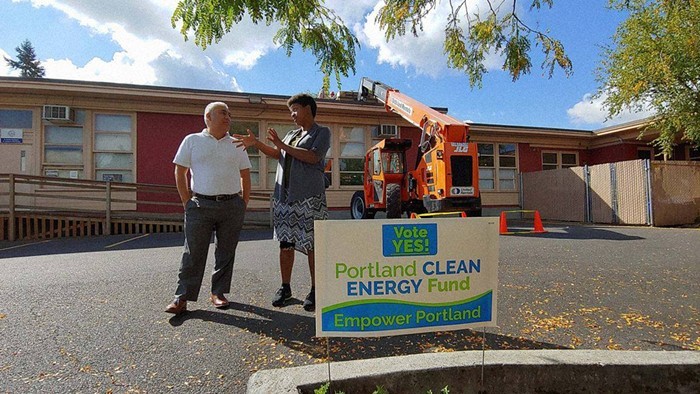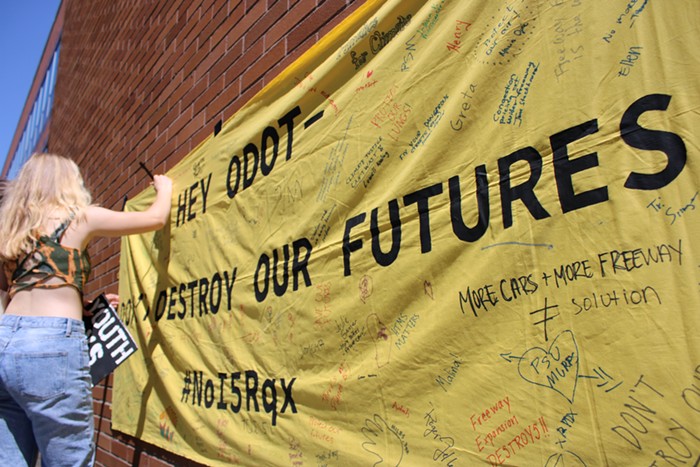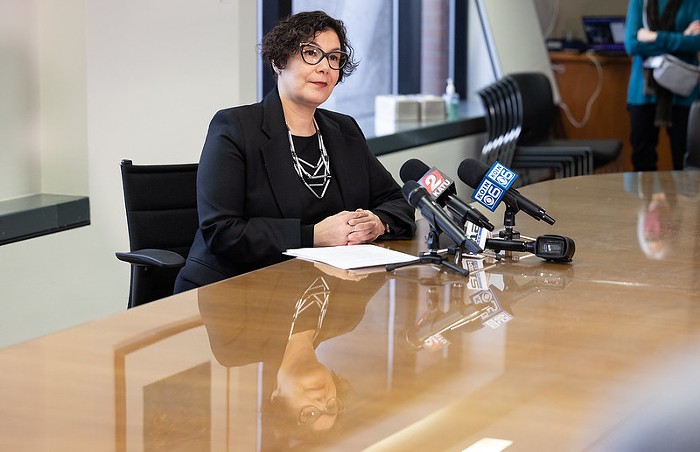The Portland Clean Energy Fund (PCEF) could soon be distributing large amounts of its yearly grant funding to government agencies and for-profit businesses along with community-based nonprofits, according to proposed program changes introduced by Portland City Commissioner Carmen Rubio Thursday. PCEF supporters believe the proposed changes maintain the integrity of the program’s mission while being responsive to the urgency of climate change.
Established by ballot measure in 2018, PCEF uses a surcharge on large retailers to award grants to community organizations for green energy projects that reduce carbon emissions, create renewable energy jobs, and benefit communities that disproportionately suffer from the effects of climate change. It's the only program in the nation that combines this funding model with climate and social equity goals.
The latest proposed changes follow a critical city audit of PCEF published last year that found that the young program needed to better define its carbon reduction goals and align itself more closely with the city’s climate plans. A press release announcing the proposal Thursday claimed the changes would allow PCEF to deliver funding for larger projects that would address the city’s climate goals more quickly.
“Each week, we face new, mounting evidence that climate change is accelerating, and our opportunity to respond is closing,” said Rubio in the press release. “Through PCEF, we have the opportunity to complete big projects that help to reduce carbon from our two largest sources of emissions – transportation and housing – and make historic investments in our city’s tree canopy. We must make these investments happen as quickly as possible, and we can do so without compromising oversight and accountability, or community vision.”
For the past two years, PCEF has accepted grant applications from community-based nonprofits for a variety of programs, like energy efficiency and workforce development. The PCEF Grant Committee, a team of nine volunteers, then reviews the hundreds of applications and scores them on feasibility and relevance to PCEF’s mission of investing in historically underserved communities, like low-income communities and people of color. The highest scoring grant proposals for each funding area are then recommended for approval by City Council. This year, the fund doled out over $100 million in funding for green energy projects—the largest investment in climate change mitigation in Portland’s history.
Under Rubio’s proposal—which must first be approved by City Council—the PCEF Grant Committee would be tasked with developing a five-year climate investment plan that would dictate funding allotments for specific climate goals in the city. For example, Rubio’s proposal directs the committee to require that PCEF distribute $40 million towards tree canopy growth and maintenance over the next five years. That plan would then be used as a guide for PCEF staff members—not volunteers—to evaluate proposals for both grants and contracts from non-profits, private businesses, and government entities to carry out those funding priorities.
While the proposal would expand PCEF eligibility for for-profit businesses, the program would maintain some restrictions. For example, a private company, not just a nonprofit, could receive PCEF funding to purchase and distribute heat pumps and cooling units through PCEF's ongoing Heat Response Program. However, according to Bureau of Planning and Sustainability spokesperson Magan Reed, a for-profit company could not apply for PCEF funds to build a new energy efficient house or be the sole recipient of grant funding. The changes would specifically allow government entities like schools to be recipients of funding.
In order to increase the amount of PCEF staff to review grant and contract proposals, the administration funding cap—the limit placed on how much money PCEF can use for its staff based on what it collects from the business surcharge—would be raised from 5 percent to 12 percent.
According to Jenny Lee, deputy director of the Coalition of Communities of Color (CCC), Rubio’s proposal is responsive to Portland’s rapidly changing climate while maintaining the original values of the PCEF program. When CCC was advocating for PCEF’s creation in 2018, the fund was viewed as a way to hold businesses who contribute the most to the city's carbon emissions accountable by using a one percent business surcharge to generate revenue for clean energy projects. As Portland proceeded to experience severe ice storms, historic wildfires, and multiple deadly heat waves, it became increasingly clear that the city needs to act more quickly to start mitigating the impacts of climate change, and PCEF’s funds may be the solution.
Due to unexpected surges in retail profits during the pandemic, PCEF has generated more revenue than originally anticipated. PCEF originally planned to distribute $40 to $60 million per year in grant funding, but ramped up to distribute over $100 million in grants during its second round of funding after exceeding its revenue projections.
By leveraging the fund’s resources, Lee believes the proposed changes will allow PCEF to finance major climate projects in the city while simultaneously continuing its community-based grant giving.
“This is such a huge opportunity with the scale of resources we have that we can respond to [climate change at scale],” Lee said. “We can do both; we can achieve the heart of PCEF’s vision, and we do have faith in the ability to make sure that there's also community accountability as all of these changes are being implemented.”
Lee noted that if the proposed changes were used to back city projects that don’t center historically underserved communities that are most vulnerable to climate change, CCC and other PCEF supporters would lobby city council for further changes to the program.
It’s unclear if the private businesses and government agencies that would be made eligible for PCEF grants and contracts under the new proposal would be required to meet the same community representation requirements currently in place for nonprofits.
PCEF was created with the intention of investing resources for climate change mitigation in historically underserved communities, specifically BIPOC and low-income Portlanders. In order to make sure the money is flowing into those communities, an applicant’s score was heavily impacted by whether the nonprofit's board was representative of the underserved community members the project would benefit. Because for-profit businesses and government agencies aren’t required to have executive boards, it’s unclear how PCEF staff would evaluate that requirement.
“We maintain our commitment to ensuring PCEF investments support the community members who have been historically marginalized and left out of the critical resources needed to live equitably in the city,” said Bureau of Planning and Sustainability spokesperson Magan Reed. “ We will be working closely with internal and external stakeholders and the PCEF Committee to work out the details of these and other areas to ensure our continued work benefits the most vulnerable members of our community.”
Commissioner Jo Ann Hardesty, who has been a crucial supporter of PCEF as the program has faced scrutiny in its early years, is supportive of the proposed changes, according to her spokesperson Matt McNally.
Rubio will present the proposal to the PCEF Grant Committee Thursday evening for input. The proposal will go in front of City Council on October 19 for discussion and public comment.




















